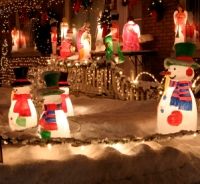

Outdoor festive lights are very common across the UK, but it is important to ensure festive displays stay on the right side of the law.
While there aren't any specific laws that are directed at festive decorations, there are still some laws that you should be aware of to make sure you have a happy and legal December.
Light nuisance
Under the Environmental Protection Act 1990, local authorities are obliged to investigate complaints about light nuisance. They will consider whether artificial light from a property:
They will also consider:
If a complaint is upheld, the defendant could be forced to remove the lights and receive a hefty fine.
Lights and public property
If you want to hang up ornaments and decorations in your town or village, you will need a Christmas Lights Licence. Also known as a decorative lighting consent, this is a licence that authorises ornaments and lights to be hung over from a road, as well as from lamp posts and trees around the local community.
Legally you must gain a licence which will permit you to attach items to a street light or lamp post. The local authority will approve a licence when it is satisfied:
The Highways Act 1980 enables the highway authority to control the erection of apparatus on or over the highway, including attachments by way of a licence or legal agreement.
Tips to legally spread festive cheer
There are many ways to ensure your Christmas spirit wont involve a dispute with a neighbour or the council. This includes: